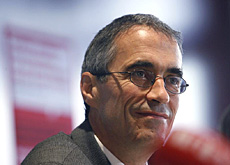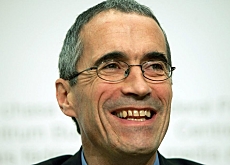Unionist crosses the line to tackle red tape

Serge Gaillard, a central figure of the Swiss trade union movement over the past decade, will on Thursday join government ranks.
In an interview with swissinfo, the new head of employment at the State Secretariat for Economic Affairs (Seco) describes how his past as a champion of workers’ rights will stand him in good stead for the future.
As poachers turned gamekeepers go, they don’t come much bigger than Gaillard. Previously chief economist at the Swiss Federation of Trade Unions, the 51-year-old has been one of the leading voices of the Swiss labour movement.
Often a thorn in the government’s side, Gaillard fought successfully for measures to protect against wage dumping following the opening of the labour market to European Union workers in 2002.
swissinfo: What persuaded you to go for the post of head of employment at Seco?
Serge Gaillard: I’ve been interested in employment-related issues all my professional life.
The head of employment is responsible for managing unemployment benefit, labour market policy, plus health and safety in the workplace. These are all, in my eyes, very important – for employees but also for the economy.
swissinfo: The government has appointed a unionist to a strategic position – does that surprise you?
S.G.: No. Despite all their political differences – largely picked up on by the public – there is very often dialogue among social partners on the administration of unemployment benefit.
In terms of the daily work of the head of employment, this dialogue has always functioned well. So in this sense, I see a certain sense of continuity in the government’s choice.

More
Seco
swissinfo: Even so, you are going from trade unionism to a job in the government, and you will have to put your old concerns to one side. Is this realistic?
S.G.: Everything we did at the Federation of Trade Unions focused on three main goals: full employment, good working conditions and economic growth capable of creating jobs, which all require a competitive economy.
As head of employment at Seco, these goals haven’t changed – unlike my role. Until now, I was the advocate or spokesman for workers’ interests. From now on I will be the person who has to find a balance between the interests of employers and unions.
swissinfo: In terms of the economy and the labour market, Switzerland is in good shape. Can things get even better?
S.G.: For the first time in 15 years, everything is going really well. Don’t forget that the ’90s were very difficult, partly as a result of an economic policy that was not based on full employment.
We, at the federation, played a major role in calling for a monetary policy that took greater account of the exchange rate and employment – and which allowed strong growth, using the risk of inflation acting as a brake.
We also demanded better wage protection – and new measures were introduced when we opened up the labour market to European Union countries. This has also played a key role in the healthy progress of the Swiss economy.
We now hope to be able to use this upturn to enable the maximum number of people to find gainful employment. For that to happen, closer cooperation is needed between firms and regional job centres.
swissinfo: During your time at the Swiss Federation of Trade Unions, how did the union landscape change in Switzerland?
S.G.: I think I can say that the federation today, as an umbrella organisation, represents a broader mix of workers than a decade ago – from builders through to railway workers, postmen to musicians, artists to social workers.
In my opinion, the federation will in future grow even bigger and become even more representative in order to retain the necessary political weight to guarantee workers’ interests.
swissinfo-interview: Pierre-François Besson

More
Swiss Trade Union Federation
Serge Gaillard, 51, became a member of the secretariat of the Swiss Federation of Trade Unions in 1993.
He was the federation’s chief economist, as well as being responsible for economic strategy and various voting campaigns.
Gaillard heads a number of expert committees on employment issues, including the labour market and changes to the unemployment benefit system.
He is also a member of the Swiss National Bank board.
Gaillard has a PhD in economics from Zurich University and has published over 30 articles.

In compliance with the JTI standards
More: SWI swissinfo.ch certified by the Journalism Trust Initiative


You can find an overview of ongoing debates with our journalists here. Please join us!
If you want to start a conversation about a topic raised in this article or want to report factual errors, email us at english@swissinfo.ch.